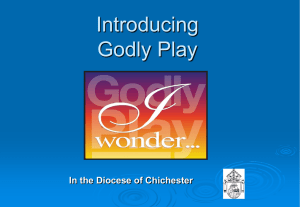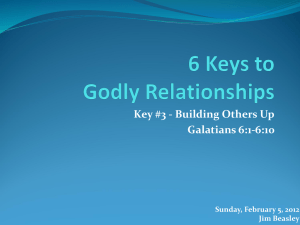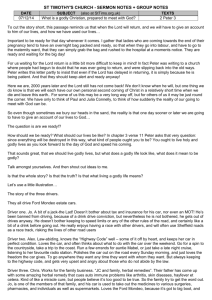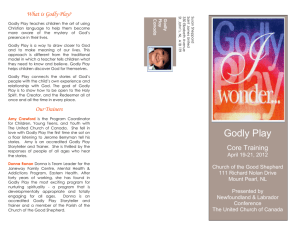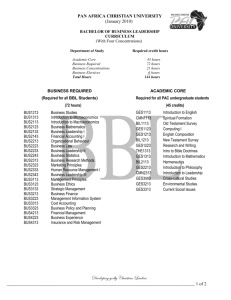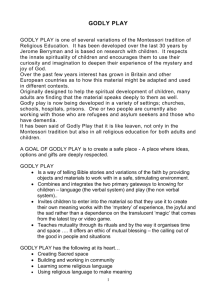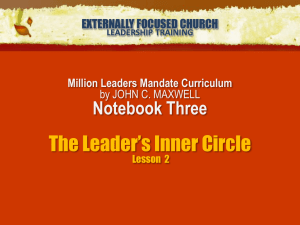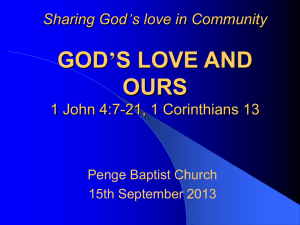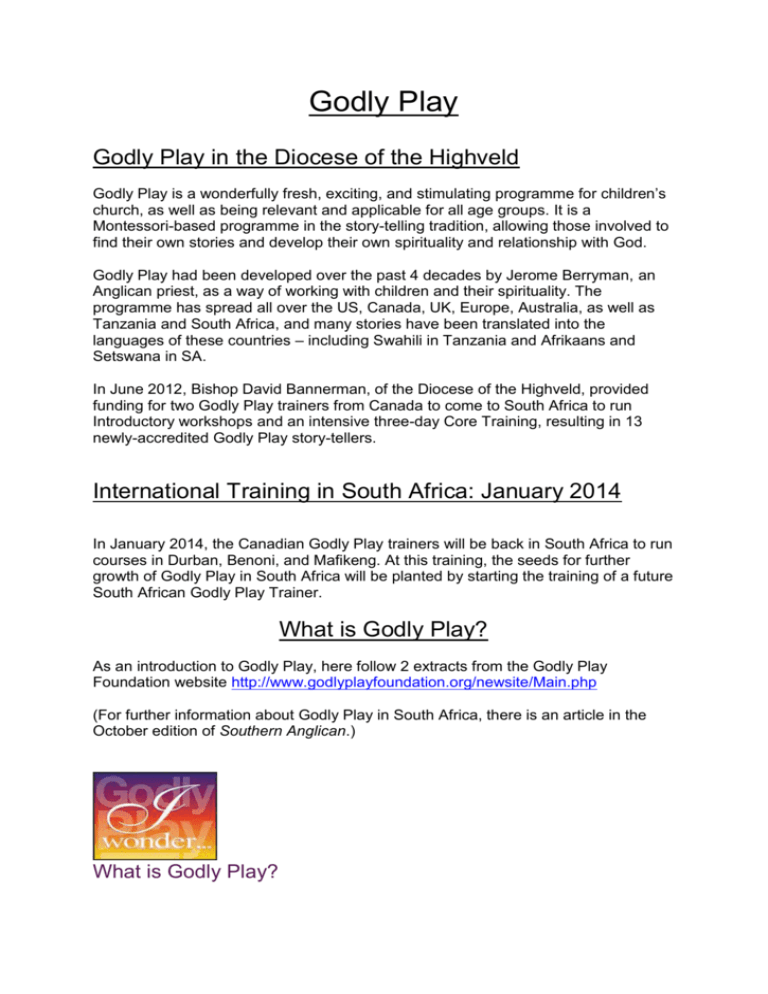
Godly Play
Godly Play in the Diocese of the Highveld
Godly Play is a wonderfully fresh, exciting, and stimulating programme for children’s
church, as well as being relevant and applicable for all age groups. It is a
Montessori-based programme in the story-telling tradition, allowing those involved to
find their own stories and develop their own spirituality and relationship with God.
Godly Play had been developed over the past 4 decades by Jerome Berryman, an
Anglican priest, as a way of working with children and their spirituality. The
programme has spread all over the US, Canada, UK, Europe, Australia, as well as
Tanzania and South Africa, and many stories have been translated into the
languages of these countries – including Swahili in Tanzania and Afrikaans and
Setswana in SA.
In June 2012, Bishop David Bannerman, of the Diocese of the Highveld, provided
funding for two Godly Play trainers from Canada to come to South Africa to run
Introductory workshops and an intensive three-day Core Training, resulting in 13
newly-accredited Godly Play story-tellers.
International Training in South Africa: January 2014
In January 2014, the Canadian Godly Play trainers will be back in South Africa to run
courses in Durban, Benoni, and Mafikeng. At this training, the seeds for further
growth of Godly Play in South Africa will be planted by starting the training of a future
South African Godly Play Trainer.
What is Godly Play?
As an introduction to Godly Play, here follow 2 extracts from the Godly Play
Foundation website http://www.godlyplayfoundation.org/newsite/Main.php
(For further information about Godly Play in South Africa, there is an article in the
October edition of Southern Anglican.)
What is Godly Play?
Godly Play teaches children the art of using Christian language - parable, sacred
story, silence and liturgical action - helping them become more fully aware of the
mystery of God’s presence in their lives.
When Christian language is learned by the Godly Play approach, it is learned as a
means to know God and to make meaning of our lives. This approach is quite
different from the traditional model in which the teacher tells the children what they
need to know. Godly Play is not about things that are that simple. It is not just about
learning lessons or keeping children entertained. It is about locating each lesson in
the whole system of Christian language and involving the creative process to
discover the depths of meaning in them. It’s about understanding how each of the
stories of God’s people connects with the child’s own experience and relationship
with God. Godly Play respects the innate spirituality of children and encourages
curiosity and imagination in experiencing the mystery and joy of God.
The goal of Godly Play is to show how to be open to the Holy Spirit, The Creator,
and the Redeemer all at once and all the time in every place. To achieve this goal is
to help children become deeply rooted as Christians and yet at the same time use
this powerful language and community to be open and creative.
Godly Play is a creative and imaginative approach to Christian nurture.
Godly Play is based on long established, tried and tested approaches.
Godly Play encourages participants to make meaning for themselves by inviting
them into stories and providing the opportunity for them to connect the stories with
their personal experience.
Godly Play is a non-coercive way to encourage people to move into larger
dimensions of belief and faith through wondering questions and open-ended
response time.
Godly Play values process, openness and discovery.
Godly Play is a way of preparing children to join in the worship and life of their
congregations as they develop a deeper understanding of stories, symbols and rites.
Although it was originally developed as a resource for children, Godly Play is now
being used with a wide range of age groups in a diversity of settings.
© 2011 Godly Play Foundation — All Rights Reserved
Centre for the Theology of Childhood
The educational theory of Godly Play is rooted in the pre-history of our
species with respect to the use of ritual, story, and the creative process.
Unfortunately, postmodern children are losing their ability to be active
participants in narrative and ritual, which impairs their use of their own
natural creativity (imago dei). The use of Montessori’s approach to
education has been adapted to Godly Play in order to stimulate children’s
active participation in story and ritual and to awaken their creativity for the
learning of the language, sacred stories, parables, liturgical action and
silence of the Christian tradition. This is the most appropriate kind of
language to cope with the existential limits to our being and knowing.
The above combination of factors enables children (and adults) to become
playfully orthodox. They become rooted in their own tradition and at the
same time open to others, to new ideas and the future in creative ways.
Jerome W. Berryman, Senior Fellow
Jerome W. Berryman has spent close to forty years creating a
methodology, constructed of pedagogy and supported by a theology,
known the world over as Godly Play. He has written numerous articles and
books. Discover more of the educational theory of Godly Play in Volume 1
of The Complete Guide to Godly Play and Teaching Godly Play.
© 2011 Godly Play Foundation — All Rights Reserved

